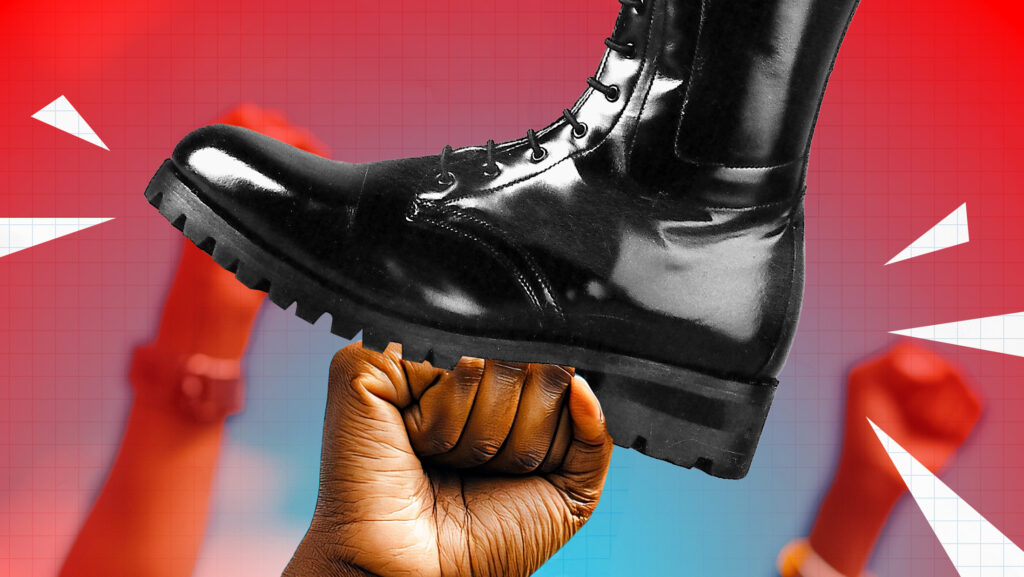Trump’s Crackdown on Protests is Spreading to Local Law Enforcement

Since President Donald Trump returned to the White House, he has led a high-profile campaign to crack down on lawful protests.
“Agitators will be imprisoned/or permanently sent back to the country from which they came,” Trump wrote on social media earlier this month, in reference to protests on college campuses.
Trump has followed up on those threats, as shown by the recent arrest of Mahmoud Khalil, a pro-Palestinian activist and recent graduate of Columbia University who is also a legal permanent resident married to an American citizen. Trump also has threatened people protesting at Tesla dealerships, in mass actions intended to target Elon Musk’s lawless government takeover. Trump wrote on social media that he would not only charge these “sick terrorist thugs” with “domestic terrorism,” but that he would also consider sending them to an El Salvador prison, just as he did with hundreds of Venezuelans without due process. Guilt is immaterial when the point is to silence dissent.
It’s clear there’s an authoritarian plot afoot to shut down the First Amendment in this country through the use of federal agencies like the Department of Justice and FBI, which Trump has staffed with loyalists. But it would be foolish to assume that it will stop with the federal government.
Local law enforcement agencies, many politically aligned with Donald Trump and awash in the antiliberal rhetoric of his administration, are also eager to adopt the unconstitutional policies of MAGA and clamp down on protests across the country, First Amendment or no. As more and more people across the country band together in legitimate political expression against the inhumane, unconstitutional and cruel policies of the Trump administration, it’s deeply troubling that politicized law enforcement agencies, especially elected sheriffs already prone to right-wing radicalization, are in charge of monitoring the streets.
Look no further than Idaho, where Kootenai County Sheriff Robert Norris, a Republican, collaborated with private security agents to remove a protester named Teresa Borrenpohl from a local GOP town hall. According to Borrenphol, and supported by other witnesses, unidentified security agents, later found to be members of a private security firm hired by the event organizers, appearing to act at the direction of Norris, grabbed Borrenphol and physically removed her from a GOP town hall after threatening her with pepper spray. (Norris denied acting unprofessionally and said that he had asked Borrenphol to leave before physically enforcing her removal.)
Local law enforcement agencies are extremely likely to increase the violent and disproportionate policing of anti-MAGA protests, as well as the mass arrests of protesters.
And in Butler County, Ohio, Sheriff Richard Jones, ever desperate for media attention, denigrated would-be protestors against Tesla dealerships, saying, “Shame on these crazy folks, who live in their mom’s basement and wear their mom’s pajamas.” Standing next to a cybertruck, he said he would rename a street “Elon Musk Lane.”
Local law enforcement are the most frequent responders to political protests and have, in the past few years, shown themselves to disproportionately crack down on left-wing protesters. For example, pro-Palestinian protesters are suing the local and campus police at the University of California, Los Angeles, for failure to protect them from a right-wing mob for five hours. It’s a tableau familiar from the 2017 Charlottesville “United the Right” rally, which ended in the death of a protester. A similar pattern repeated across the country as local law enforcement responded to student protestors with tear gas, riot gear, and zip ties. Some reporters even called out snipers on roofs.
Even before Trump’s election, local law enforcement agencies had been markedly aggressive towards protesters, including many associated with Black Lives Matter in the summer of 2020. At protests over Atlanta’s proposed “Cop City” — a $90 million, 171-acre construction project for a law enforcement training facility in what was forest land — local law enforcement treated the protesters as terrorists, using SWAT-team tactics and flashbangs. One protester was killed; no law enforcement officers were charged.
Sometimes the federal government has encouraged local law enforcement to take a no-holds-barred approach. Last year, then-FBI director Christopher Wray spoke to members of the National Sheriffs’ Association to warn them about potential terrorist attacks by student groups. Local law enforcement have already shown themselves willing to use excessive force and surveillance to monitor, harass, intimidate, and arrest protestors. Now that the FBI is led by Kash Patel, it is only logical that the message to local sheriffs is even more clear: Feel free to arrest and detain anyone you do not like.
The media has, rightly, been focused on the threats from the federal government. But even though the Trump administration’s constitutional violations loom large, the vast majority of the 18,000 law enforcement agencies in the United States are local. Taking their cues from the federal government, local law enforcement agencies are extremely likely to increase the violent and disproportionate policing of anti-MAGA protests, as well as the mass arrests of protesters.
Jessica Pishko is an independent journalist and lawyer who focuses on how the criminal justice system and law enforcement intersects with political power. As a Democracy Docket contributor, Jessica writes about the criminalization of elections and how sheriffs in particular have become a growing threat to democracy.